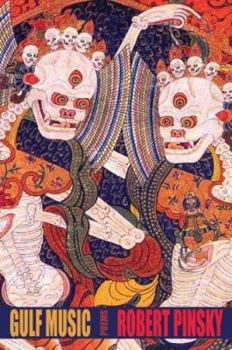Gulf Music
Select Format
Select Condition 
Book Overview
Dollars, dolors. Callings and contrivances. King Zulu. Comus. Sephardic ju-ju and verses. Voodoo mojo, Special Forces. Henry formed a group named Professor Longhair and his Shuffling Hungarians. After so much renunciation And invention, is this the image of the promised end? All music haunted by all the music of the dead forever. Becky haunted forever by Pearl the daughter she abandoned For love, O try my tra-la-la, ma la belle, mah walla-woe. -from "Gulf Music" An improvised, even desperate music, yearning toward knowledge across a gulf, informs Robert Pinsky's first book of poetry since Jersey Rain (2000). On the large scale of war or the personal scale of family history, in the movements of people and cultures across oceans or between eras, these poems discover connections between things seemingly disparate. Gulf Music is perhaps the most ambitious, politically impassioned, and inventive book by this major American poet.
Format:Hardcover
Language:English
ISBN:0374167494
ISBN13:9780374167493
Release Date:October 2007
Publisher:Farrar Straus Giroux
Length:83 Pages
Weight:1.00 lbs.
Dimensions:0.5" x 6.3" x 9.2"
Customer Reviews
2 ratings
Music to my ears
Published by Thriftbooks.com User , 16 years ago
Robert Pinsky is well known to many, having been Poet Laureate, written a book review column, appeared on the Newshour, and led the Favorite Poem Project. But how many read his poetry? In Gulf Music, Pinsky shows us what a strong poet he truly is, with a great range and all kinds of strategies for making a poem interest and delight his reader and listening audience. Truth in advertising: I have myself been a participant in Pinsky's Favorite Poem Project, one of the really great services done for poetry in our daily life that I can think of. But look at these poems, read them out loud and listen to their melody. You can take the political poems. They do put events of our lives in perspective, and they do it well. But look at First Things to Hand--a series of poems about ordinary objects that prove anything but ordinary--a glass, a book, a jar of pens, a door--really proving what poetry and Pinsky can do. By far my favorite, found among the few translations at the end of Gulf Music (more truth in advertising: I love Latin poetry and even wrote a poem about the Latin language) is The Wave, Pinsky's translation of Virgil, Georgics III:237-244: A breast-shaped curve of wave begins to whiten And rise above the surface, the rolling on Gathers and gathers until it reaches land Huge as a mountain and crashes among the rocks Was Virgil a contemporary poet? This is a really deft treatment and brings this little gem from the Georgics (translations of which are usually plodding and dull) up to date. This is NOT the stuff of Latin class, but something we can understand and relate to emotionally. You might want to take a look at my earlier review of Pinsky's Democracy, Culture and the Voice of Poetry (The University Center for Human Values Series), where he makes a great statement about the place of poetry in our national life. But in the midst of all Pinsky's commentary and his great public argument about poetry--the 21st Century equivalent of Sidney's Defense--let's not forget what matters most: the truly fine poetry that Pinsky is creating.
perhaps his best
Published by Thriftbooks.com User , 17 years ago
Pinsky is an amazing poet and this is a strong collection. Some of the poems were published in a chap book recently which I had already purchased awhile back. Still, the rest of the poems were so enjoyable I had to pick this up, too. If you like contemporary poetry (yeah, what does that mean?), especially with a political flavor, this may be just what you are looking for.





